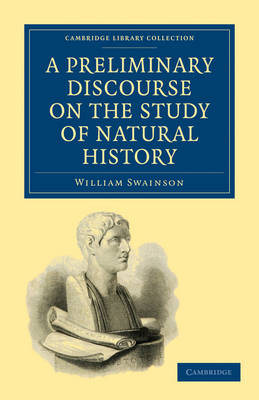
A Preliminary Discourse on the Study of Natural History
Seiten
2009
Cambridge University Press (Verlag)
978-1-108-00523-4 (ISBN)
Cambridge University Press (Verlag)
978-1-108-00523-4 (ISBN)
William Swainson (1789–1855) considers here the successful pursuit of zoology. Emphasising the key importance of taxonomy, Swainson advocated the now defunct 'quinary' system of classification. More than a mere historical curiosity, this work was one of the many which provided an intellectual context for the theory of evolution.
William Swainson F. R. S., was recognised principally as a zoologist, an ornithologist and a skilled and prolific illustrator. He also had a tremendous enthusiasm for seeking and identifying new species. In this 1834 volume however, Swainson addressed the nature of, foundations for and successful pursuit of zoology. It argues firmly for the key importance of taxonomy. Swainson was an ardent advocate of MacLeay's now entirely outmoded 'quinary' system of classification – even then a distinctly minority view. This sought affinities, patterns and analogies among organisms, in order to discern God's order. More than a mere curiosity, such work was of pivotal concern to enterprising naturalists of the 1820s and 1830s – including the young Charles Darwin. It also reached Robert Chambers, whose 1844 Vestiges of the Natural History of Creation was an important landmark in the development of the theory of evolution.
William Swainson F. R. S., was recognised principally as a zoologist, an ornithologist and a skilled and prolific illustrator. He also had a tremendous enthusiasm for seeking and identifying new species. In this 1834 volume however, Swainson addressed the nature of, foundations for and successful pursuit of zoology. It argues firmly for the key importance of taxonomy. Swainson was an ardent advocate of MacLeay's now entirely outmoded 'quinary' system of classification – even then a distinctly minority view. This sought affinities, patterns and analogies among organisms, in order to discern God's order. More than a mere curiosity, such work was of pivotal concern to enterprising naturalists of the 1820s and 1830s – including the young Charles Darwin. It also reached Robert Chambers, whose 1844 Vestiges of the Natural History of Creation was an important landmark in the development of the theory of evolution.
Part I. Rise and Progress of Zoology; Part II. On the General Nature and Advantages of the Study of Natural History; Part III. Of the Principles on which Natural History Relies for Its Successful Prosecution and the Considerations by which the Natural System may Developed; Part IV. On the Present State of Zoological Science in Britain and on the Means Best Calculated for Its Encouragement and Extension.
| Erscheint lt. Verlag | 24.9.2009 |
|---|---|
| Reihe/Serie | Cambridge Library Collection - Zoology |
| Zusatzinfo | Worked examples or Exercises |
| Verlagsort | Cambridge |
| Sprache | englisch |
| Maße | 140 x 216 mm |
| Gewicht | 610 g |
| Themenwelt | Geschichte ► Teilgebiete der Geschichte ► Technikgeschichte |
| ISBN-10 | 1-108-00523-3 / 1108005233 |
| ISBN-13 | 978-1-108-00523-4 / 9781108005234 |
| Zustand | Neuware |
| Haben Sie eine Frage zum Produkt? |
Mehr entdecken
aus dem Bereich
aus dem Bereich
Buch | Softcover (2024)
Lehmanns Media (Verlag)
CHF 27,90
Digitalisierung neu denken für eine gerechte Gesellschaft
Buch | Hardcover (2023)
Quadriga (Verlag)
CHF 27,95
Vom Perceptron zum Deep Learning
Buch | Softcover (2022)
Springer Vieweg (Verlag)
CHF 27,95


